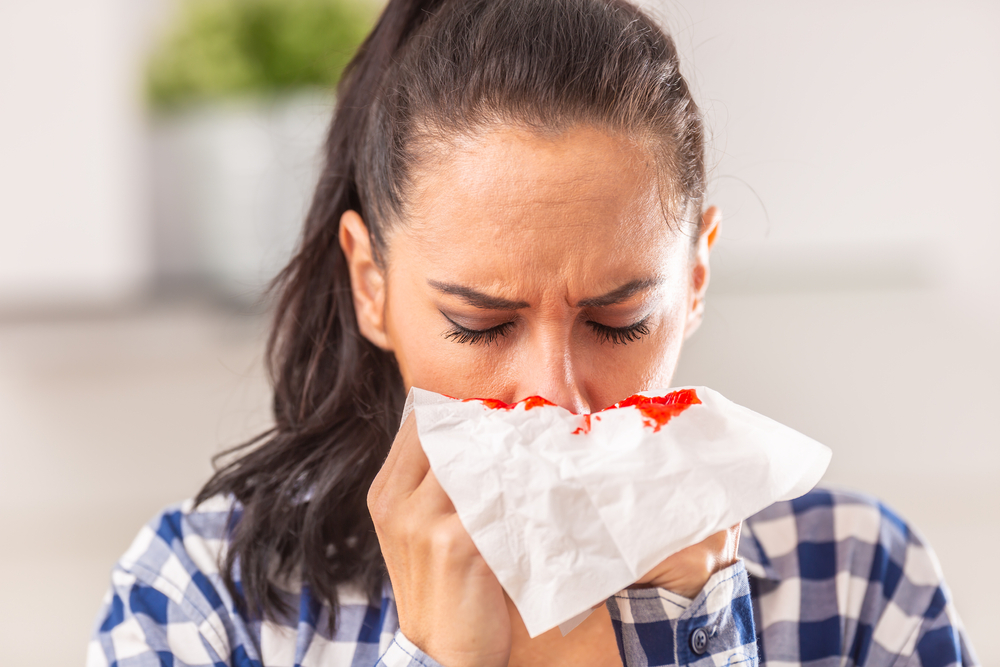Nosebleeds may give you goosebumps, but it is not a sign of a serious condition. Medically, nose bleeding is known as epistaxis. Several factors can cause your nose to bleed.
Some nosebleed reasons include the dry air or low humidity climate. Your nose contains blood vessels that bleed when your nose gets exposed to a dry atmosphere.
Other reasons may include allergies, injuries like falling, picking your nose, blowing your nose too hard, medicine side effects, high altitude, etc.
An injury may also cause this condition which is not a serious sign until it bleeds continuously. You can get help from our best ENT specialists for the treatment.
Well, you need a complete guideline to learn how you can stop a nosebleed.
The following steps plus prevention tips can help to deal with nosebleeds at home.
Table of Contents
Guideline to Stop Nosebleed
Getting a nosebleed may scare you but you should stay calm and practice the following steps:
1. Do Not Tip Head Back and Sit Upright
You should lean slightly forward when you have epistaxis. This position will prevent the blood flow down to the throat. If you tip your head back, it will drain blood down the throat and result in choking. The blood may also go to the stomach that can cause discomfort.
Make sure that you breathe through your mouth and stay calm.
2. Resist to Stiff your Nose
Epistaxis may scare you, but you should not use any object to stop bleeding. Some people use cotton pads, tampons, and even tissues to stick the nose.
Such things can irritate the blood vessels and result in less pressure to stop them. All you can do is use tissue paper to let the blood come out on the paper.
3. Apply Pressure
Apply pressure on the soft front part of your nose. It is crucial as there are blood vessels near the soft area of the nose. Putting pressure will help in compressing the blood vessels.
4. Wait for the Bleed to Stop
Put pressure on the nose for at least 10 to 15 minutes. It will help to stop the nosebleed but you should get medical help if you do not find any improvement.
Tips to do After a Nose bleeding
Your damaged blood vessels need time to heal. The following steps can protect your nose from bleeding again.
1. Avoid Picking Your Nose
No matter if it’s been only a day after having a nosebleed, you must need to be careful. Nose picking irritates the nasal membranes and increases the risk of having bleeding over again.
2. Skip Nose Blowing
People often go too hard while blowing their noses. But it can cause your nose to bleed again if you try to blow it. You can gently blow your nose, which can help to get rid of all the stuff and prevent further damage.
3. Try an Ice Pack
To tighten your blood vessels, you can apply an ice pack. You can repeat its application throughout the day. Avoid leaving the ice on your skin for more than 10 minutes.
4. Avoid Lifting Heavy Objects
You just have had a nosebleed which means you can have it again if not, stay careful. Bending down and performing intense physical activity may lead to damaged blood vessels and trigger epistaxis.
You can also prevent nosebleeds.
How?
Let’s explore in the following section.
How to Prevent a Nose Bleeding
If you have been prone to nosebleeds since your childhood, the following tips can help to prevent it.
1. Trim Your Fingernails
Most of the nosebleed cases come due to sharp and long nails that can hurt the blood vessels. Nose picking with long nails also increases the risk of damage to the blood vessels. It is possible that you scratch your nose while sleeping, which may also lead to this condition.
2. Keep your Room Air Moist
A humidifier is also a good choice to keep your home air moist. It helps to keep the mucous membrane moist and prevent it from drying out. Always clean the humidifier and avoid using tap water. You can ask your doctor what solution is the best to add to a humidifier.
3. Keep your Nose Lining Moist
Inhaling dry air can irritate your nose as it dries out the mucus membrane that cause nose bleeding. A saline spray can also help to prevent drying out your mucus membrane. Petroleum jelly is also a good alternative that can reduce the risk.
4. Quit Smoking
We all know how dangerous smoking is, especially for our lungs. If you are prone to nosebleeds, quit smoking. Smoking irritates the nose insides and dries it out. When you skip smoking and use petroleum jelly to keep the inside of your nose moist, there will be a lower risk of nose bleeding.
5. Wear Protective Equipment
Being a player in sports increases the risk of injuries. Make sure that you wear all the protective equipment that covers every part where you can get an injury. Always keep the first aid kit while playing sports.
6. Maintain your Blood Pressure
High blood pressure is more likely to increase the risk of the nosebleed. You can ask your doctor or choose healthy lifestyle choices to maintain your blood pressure.
Avoid intake of too much salt and maintain a healthy weight to manage hypertension issues.
Get Medical Help If…
Having a nosebleed isn’t a life-threatening condition, but it must stop within 15 minutes. If it continually bleeds, you should ask for help. You may feel dizzy after losing too much blood.
Such a condition may also cause difficulty in breathing. Always sit up, or blood can enter your stomach that makes you vomit.
Consult your doctor if you experience these signs.
